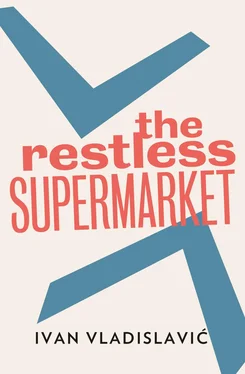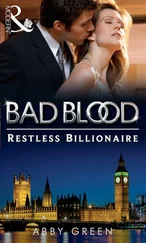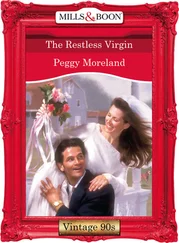The speciality of the Haifa Hebrew Restaurant was not, as one might have expected, traditional delicacies such as smoked salmon or gefilte fish (chopped fish mixed with crumbs, eggs and seasonings), which I had come across before on hotel menus, but things called schwarmas , composed primarily of grilled lamb. A special device had been installed for their manufacture. The lamb, piled up into a tower on an electric spit, was suffered to gyrate crazily before red-hot elements, while a singed onion and a deflating tomato, skewered at the top of the tower, dribbled their juices down its length. (These juices, dispelled in aromatic vapour, often made mouths water in the Café Europa up above.) I had peered into the smoky interior of the restaurant several times in passing and mistaken the translucent orb at the top for a sheep’s eye: the discovery that it was something more palatable was the immediate reward of my first venture across the threshold. A sign picked out in plastic lettering on an illuminated glass panel of Mediterranean blue informed the paying public that the lamb now rotating would be served in a so-called pita , with tehini , which sounded merely laughable, or humus , which sounded truly nauseating. It was that infelicitous ‘humus’, glimpsed from the doorway a few days earlier, which had brought me here in defiance of the threat of bomb blasts that hung in those days over fast-food establishments. I have no special knowledge of the Hebrew tongue, but I had done my homework in the greatest school of all, the Oxford English Dictionary , and came equipped for battle. Although this was a professional visit, I did not want to appear ill-mannered, and so I ordered one of the schwarmas, and while the chef was carving my portion with a machete, introduced myself to the manager, a certain Shlomo.
‘Forgive me if I speak frankly,’ I said after the pleasantries, ‘but you do not want to put “humus” on the mutton.’
‘Hey? What you?’ and so forth.
‘“Humus” is in the ground. Decomposing vegetable matter in the soil. Leaves, peelings, biodegradable stuff. What you want is “hummus”. Two m’s.’
‘Two humus fifty cent extra,’ said Shlomo, whose intellectual apparatus really did seem to be in slow motion, going to talk with his lady friend at the other end of the counter.
I pursued him with the dictionary. The seventh edition of the Concise was the first to record ‘hummus’ and I had brought it along purposely to show him the entry. ‘Look — two m’s. Em-em.’
‘English not so good,’ he said with a sympathetic grin, which made me suspect that he was referring to mine! Then I noticed the derivation: from the Turkish humus . An awkward moment. A version with one m could only cloud the issue. I put the dictionary away and resorted to some schoolboy dactylology and the mouthing of duo and tuo and twain, hoping to hit on something that would approximate the Hebrew. ‘Bi, bi,’ I said.
‘Bye-bye,’ chirruped the lady friend and pointed at my head with her Craven A. Some days before, I had scratched my salient excrescence — cranial, high noon — on an overhanging branch at Pullinger Kop, and it was still inflamed. I retired self-consciously to a dimmer corner of the counter.
To my surprise, the schwarma was quite tasty, and the double helping of hummus did no harm — in fact, I have preferred it that way ever since. Instead of the customary plate, there was an ingenious little aluminium stand like a letter-rack for propping the schwarma in, and as the pita itself was rather like an envelope of unleavened bread with enclosures of lettuce and lamb, it suited very well. I resolved there and then to become more cosmopolitan in my eating habits, even as I set about the big ‘clean-up’.
Alas, all my attempts to alert the shopkeepers of Hillbrow to the errors of their ways met with the same inarticulate incomprehension I had encountered at the Haifa. After half an hour of fruitless argumentation, the manager of the Restless Supermarket — he had introduced himself as Stan, although the badge on his lapel clearly said Stelios — showed me into his little office, a mezzanine cubicle with pegboard walls and gunmetal furniture. In the top drawer of the desk I saw lying a stapler, a bottle of Liquid Paper (God help us), and a revolver. When I had seen the stationery, he pushed the drawer shut with his thigh and offered me a drink, which I accepted out of politeness. He said:
‘My friend, we ollaways open. You come any day, twenty-four hour.’
‘I accept that, Stelios (if I may). But my point is that “restless” doesn’t mean that you never rest. Don’t you see? It means, and I quote, never still, fidgety.’
‘But we ollaways busy, never close.’
‘You’d be even busier if you’d just listen to me, man. The name “Restless Supermarket”, it creates the wrong impression. One thinks of mess, of groceries jumbled together, of groceries jumbling themselves together, of wilful chaos. Is that what you want?’
He looked disbelievingly at the shelves on the closed-circuit television, where sturdy towers of Bourneville cocoa and orderly ranks of tinned fruit and washing powder mutely supported my argument, and said, ‘My friend, you come two o’clock, you come three o’clock, I’m talking a.m., I got fresh rolls.’
‘That’s another thing, that sign on the bakery wall that says: “All our food is fresh and clean.” Clean food? I’m sorry, it doesn’t make sense.’
After ten minutes of this, he opened the drawer again.
Then there was the time I ventured down Nugget Hill to the Casablanca Roadhouse, no easy walk with my knees, to point out the unwitting obscenity that shoddy neon calligraphy had produced in FLICK LIGHTS FOR SERVICE. They wouldn’t hear a word of it. Fuck you too, they said quite amiably. Not having a car made my mission doubly difficult: the waiter kept asking what had become of my ‘wheels’ and pretending to attach the tray to my forearm. I had to eat a Dagwood Bumstead for my pains, the speciality of the house, served at a very uncomfortable picnic table with a round of dill pickle adhering to the outside of the wax-paper wrapping. It was one culinary adventure that did not bear repeating, although it repeated itself of its own accord, ad nauseam.
And then there were the ‘wanton dumplings’ at the Majestic Tasty Chinese Take Away, which I wouldn’t touch with a disposable chopstick, and the unfortunate messages in the fortune biscuits.
Not all my efforts at reform, nor even my most telling ones, had to do with commercial signage or catering. Once Spilkin complained so bitterly about the typographical errors in a book he had just purchased that I was persuaded to look into it myself. I hadn’t read a novel in twenty years, and one glance at the contents of The Unhappy Millionaire showed the wisdom of abstention: it was the story of an American Midas whose life had been ruined by his immeasurable riches. On the other hand, it seemed that I had been neglecting an exceptionally rich field for my System of Records. I found a spelling mistake on the title-page and a dittography in the first line. There were five obvious corrigenda on the first page alone. Some professionals regard one proofreading error in five pages as an acceptable norm; I myself think that one should aim for perfection and let the norms take care of themselves. Spilkin was reluctant to demand a refund from the bookseller, and so I took matters into my own hands.
The publishing house was a well-known English one with branches, or perhaps one should say tentacles, all over the world. I decided to make an example of them. I spent the next week proofreading this corny farrago, meticulously as you please, and then mailed it to their head office in London, surface mail. Was it any wonder, my covering letter said, that this millionaire was unhappy, finding himself in such a shabbily produced publication? They were welcome to share my work with their editorial department as a lesson in how it should be done.
Читать дальше












